外教口语考试问题整理
- 格式:doc
- 大小:25.50 KB
- 文档页数:1
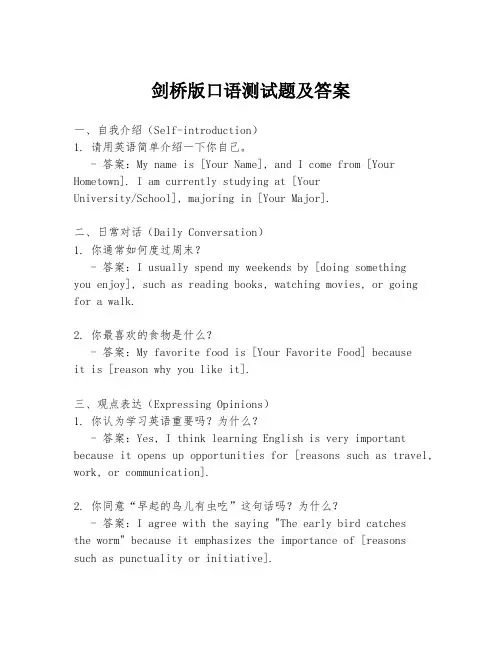
剑桥版口语测试题及答案一、自我介绍(Self-introduction)1. 请用英语简单介绍一下你自己。
- 答案:My name is [Your Name], and I come from [Your Hometown]. I am currently studying at [YourUniversity/School], majoring in [Your Major].二、日常对话(Daily Conversation)1. 你通常如何度过周末?- 答案:I usually spend my weekends by [doing somethingyou enjoy], such as reading books, watching movies, or going for a walk.2. 你最喜欢的食物是什么?- 答案:My favorite food is [Your Favorite Food] becauseit is [reason why you like it].三、观点表达(Expressing Opinions)1. 你认为学习英语重要吗?为什么?- 答案:Yes, I think learning English is very important because it opens up opportunities for [reasons such as travel, work, or communication].2. 你同意“早起的鸟儿有虫吃”这句话吗?为什么?- 答案:I agree with the saying "The early bird catchesthe worm" because it emphasizes the importance of [reasons such as punctuality or initiative].四、描述经历(Describing Experiences)1. 请描述一次你难忘的旅行。
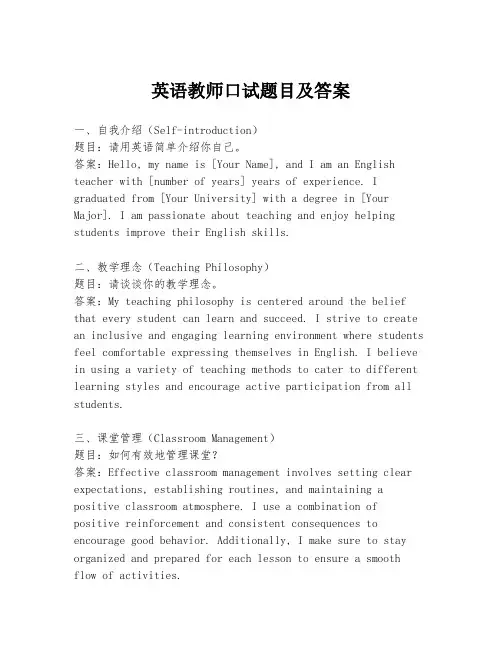
英语教师口试题目及答案一、自我介绍(Self-introduction)题目:请用英语简单介绍你自己。
答案:Hello, my name is [Your Name], and I am an English teacher with [number of years] years of experience. I graduated from [Your University] with a degree in [Your Major]. I am passionate about teaching and enjoy helping students improve their English skills.二、教学理念(Teaching Philosophy)题目:请谈谈你的教学理念。
答案:My teaching philosophy is centered around the belief that every student can learn and succeed. I strive to create an inclusive and engaging learning environment where students feel comfortable expressing themselves in English. I believe in using a variety of teaching methods to cater to different learning styles and encourage active participation from all students.三、课堂管理(Classroom Management)题目:如何有效地管理课堂?答案:Effective classroom management involves setting clear expectations, establishing routines, and maintaining a positive classroom atmosphere. I use a combination ofpositive reinforcement and consistent consequences to encourage good behavior. Additionally, I make sure to stay organized and prepared for each lesson to ensure a smooth flow of activities.四、教学方法(Teaching Methods)题目:你通常使用哪些教学方法?答案:I employ a variety of teaching methods to cater to the diverse needs of my students. These include directinstruction, cooperative learning, project-based learning,and the use of technology in the classroom. I alsoincorporate games and interactive activities to make learning fun and engaging.五、评估学生(Assessing Students)题目:你如何评估学生的学习成果?答案:I use a combination of formative and summative assessments to evaluate student learning. Formative assessments, such as quizzes and class discussions, help me gauge student understanding and adjust my teaching strategies accordingly. Summative assessments, like exams and final projects, provide a comprehensive evaluation of a student's progress over a longer period.六、教学挑战(Teaching Challenges)题目:在教学过程中,你遇到了哪些挑战?答案:One of the main challenges I face is ensuring that all students remain engaged and motivated. Some students may struggle with the language or have difficulty staying focused. To address these challenges, I try to personalize my instruction, provide extra support when needed, andincorporate elements of student interest into the curriculum.七、专业发展(Professional Development)题目:你如何保持自己的专业发展?答案:I stay up-to-date with the latest teachingmethodologies and educational research by attending workshops, participating in professional communities, and continuing my education. I also collaborate with other teachers to share ideas and best practices, which helps me grow both personally and professionally.八、教学目标(Teaching Goals)题目:你对学生有哪些教学目标?答案:My primary goal is to help students develop a strong foundation in English language skills, including reading, writing, listening, and speaking. I also aim to fostercritical thinking, cultural awareness, and a lifelong lovefor learning. By achieving these goals, I hope to prepare my students for success in their academic and professional lives.。
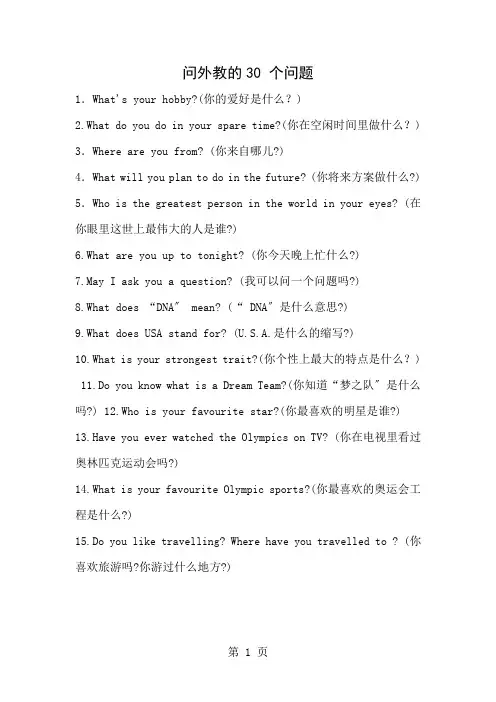
问外教的30 个问题1.What's your hobby?(你的爱好是什么?)2.What do you do in your spare time?(你在空闲时间里做什么?) 3.Where are you from? (你来自哪儿?)4.What will you plan to do in the future? (你将来方案做什么?) 5.Who is the greatest person in the world in your eyes? (在你眼里这世上最伟大的人是谁?)6.What are you up to tonight? (你今天晚上忙什么?)7.May I ask you a question? (我可以问一个问题吗?)8.What does “DNA〞mean? (“ DNA〞是什么意思?)9.What does USA stand for? (U.S.A.是什么的缩写?)10.What is your strongest trait?(你个性上最大的特点是什么?)11.Do you know what is a Dream Team?(你知道“梦之队〞是什么吗?) 12.Who is your favourite star?(你最喜欢的明星是谁?) 13.Have you ever watched the Olympics on TV? (你在电视里看过奥林匹克运动会吗?)14.What is your favourite Olympic sports?(你最喜欢的奥运会工程是什么?)15.Do you like travelling? Where have you travelled to ? (你喜欢旅游吗?你游过什么地方?)16.What famous buildings do you know?(你知道哪些著名的建筑?)17.What is your favourite colour and fruit?(你最喜欢的颜色和水果是什么?)18.What do you usually eat for lunch and supper? (通常情况下,你的晚餐和午餐都吃什么?)19.Do you know how to cook?What do you like to cook? (你知道怎么做饭吗?你喜欢做什么饭菜?)20.Have you ever helped or given money to someone?Is it important to help people who don’t have enough money? (你曾帮助或捐赠过钱给他人吗?帮助那些穷人是重要的吗?)21.How do you feel when you catch a cold?(你感冒后的感觉是怎样的?)22.Where do you come from?(你来自哪儿?)23.Do you like China? Why?(你喜欢中国吗?为什么?)24.Have you ever travelled to Dafosi and Matisi?(你游过大佛寺和马蹄寺吗?)25.How do you think of the Runquanhu park?(你认为润泉湖公园怎么样?)26.What do you know about dinosaurs and UFO? (你知道的恐龙和飞碟的知识是什么?)27.What do you want to be in your childhood?(在你童年的时候你想成为什么人?)29.How many clubs are there in your school?(你们学校有多少俱乐部?)30.Would you like to teach us an English song?(你愿意教我们一首英语歌曲吗?)。
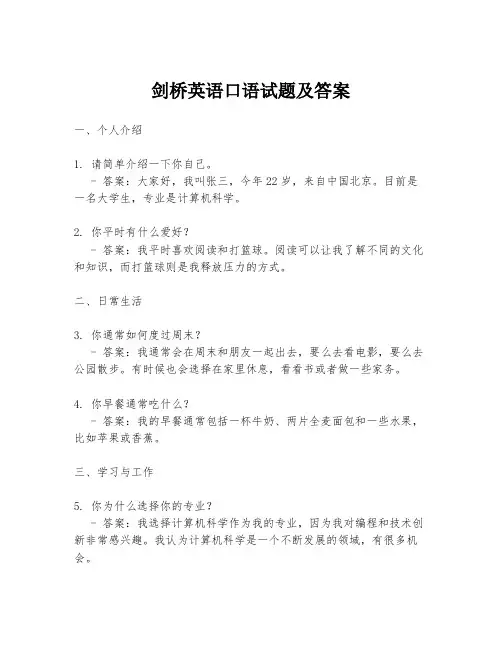
剑桥英语口语试题及答案一、个人介绍1. 请简单介绍一下你自己。
- 答案:大家好,我叫张三,今年22岁,来自中国北京。
目前是一名大学生,专业是计算机科学。
2. 你平时有什么爱好?- 答案:我平时喜欢阅读和打篮球。
阅读可以让我了解不同的文化和知识,而打篮球则是我释放压力的方式。
二、日常生活3. 你通常如何度过周末?- 答案:我通常会在周末和朋友一起出去,要么去看电影,要么去公园散步。
有时候也会选择在家里休息,看看书或者做一些家务。
4. 你早餐通常吃什么?- 答案:我的早餐通常包括一杯牛奶、两片全麦面包和一些水果,比如苹果或香蕉。
三、学习与工作5. 你为什么选择你的专业?- 答案:我选择计算机科学作为我的专业,因为我对编程和技术创新非常感兴趣。
我认为计算机科学是一个不断发展的领域,有很多机会。
6. 你在学习过程中遇到了哪些挑战?- 答案:在学习过程中,我遇到的最大挑战是理解复杂的算法和编程语言。
为了克服这些挑战,我经常和同学讨论,并向老师寻求帮助。
四、旅行与文化7. 你曾经去过哪个国家旅行?- 答案:我去过日本旅行。
那里的文化和风景给我留下了深刻的印象。
我特别喜欢日本的樱花和古老的寺庙。
8. 你最喜欢哪个节日,为什么?- 答案:我最喜欢春节。
因为这是家人团聚的时候,我们可以一起吃年夜饭,放烟花,享受节日的氛围。
五、未来规划9. 你对未来有什么计划?- 答案:我计划在毕业后找一份与计算机科学相关的工作。
长远来看,我希望能够创立自己的科技公司,为社会做出贡献。
10. 你如何看待终身学习?- 答案:我认为终身学习非常重要。
在快速变化的世界中,不断学习新的知识和技能可以帮助我们保持竞争力,并适应新的挑战。
六、观点与看法11. 你认为环境保护重要吗?为什么?- 答案:我认为环境保护非常重要。
我们只有一个地球,保护环境不仅是为了我们自己,也是为了我们的后代。
12. 你如何看待社交媒体的影响?- 答案:社交媒体在现代社会中扮演着重要的角色,它让我们能够快速获取信息和与他人交流。
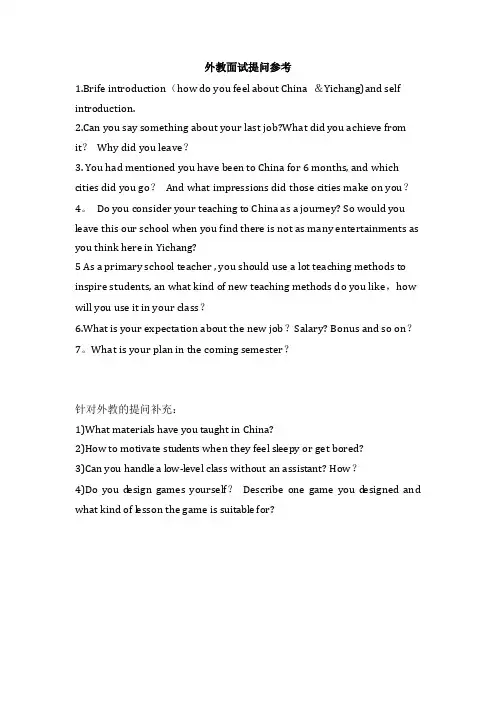
外教面试提问参考1.Brife introduction(how do you feel about China &Yichang)and self introduction.2.Can you say something about your last job?What did you achieve from it?Why did you leave?3. You had mentioned you have been to China for 6 months, and which cities did you go?And what impressions did those cities make on you?4。
Do you consider your teaching to China as a journey? So would you leave this our school when you find there is not as many entertainments as you think here in Yichang?5 As a primary school teacher , you should use a lot teaching methods to inspire students, an what kind of new teaching methods do you like,how will you use it in your class?6.What is your expectation about the new job?Salary? Bonus and so on?7。
What is your plan in the coming semester?针对外教的提问补充:1)What materials have you taught in China?2)How to motivate stud ents when they feel sl eepy or get bored?3)Can you handl e a low-level class without an assistant? How?4)Do you d esign games yourself?Describe one game you d esigned and what kind of l esson the game is suitabl e for?。
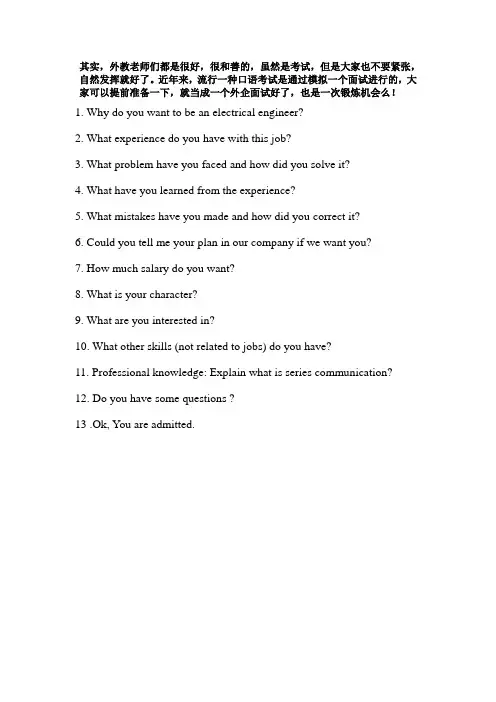
其实,外教老师们都是很好,很和善的,虽然是考试,但是大家也不要紧张,自然发挥就好了。
近年来,流行一种口语考试是通过模拟一个面试进行的,大家可以提前准备一下,就当成一个外企面试好了,也是一次锻炼机会么!
1. Why do you want to be an electrical engineer?
2. What experience do you have with this job?
3. What problem have you faced and how did you solve it?
4. What have you learned from the experience?
5. What mistakes have you made and how did you correct it?
6. Could you tell me your plan in our company if we want you?
7. How much salary do you want?
8. What is your character?
9. What are you interested in?
10. What other skills (not related to jobs) do you have?
11. Professional knowledge:Explain what is series communication?
12. Do you have some questions ?
13 .Ok,You are admitted.。
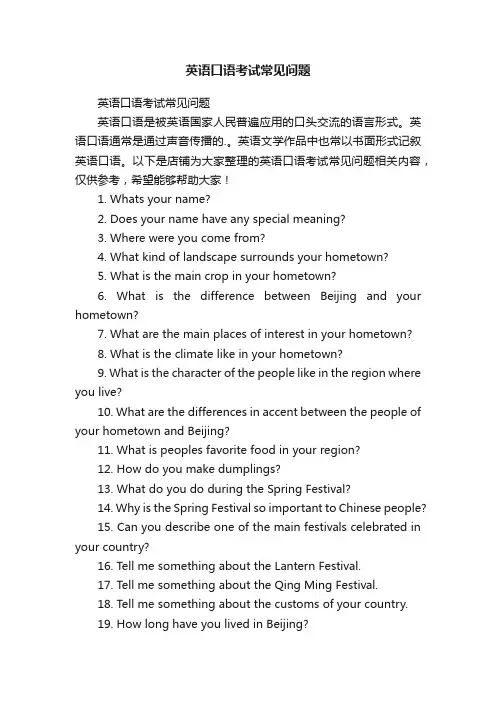
英语口语考试常见问题英语口语考试常见问题英语口语是被英语国家人民普遍应用的口头交流的语言形式。
英语口语通常是通过声音传播的.。
英语文学作品中也常以书面形式记叙英语口语。
以下是店铺为大家整理的英语口语考试常见问题相关内容,仅供参考,希望能够帮助大家!1. Whats your name?2. Does your name have any special meaning?3. Where were you come from?4. What kind of landscape surrounds your hometown?5. What is the main crop in your hometown?6. What is the difference between Beijing and your hometown?7. What are the main places of interest in your hometown?8. What is the climate like in your hometown?9. What is the character of the people like in the region where you live?10. What are the differences in accent between the people of your hometown and Beijing?11. What is peoples favorite food in your region?12. How do you make dumplings?13. What do you do during the Spring Festival?14. Why is the Spring Festival so important to Chinese people?15. Can you describe one of the main festivals celebrated in your country?16. Tell me something about the Lantern Festival.17. Tell me something about the Qing Ming Festival.18. Tell me something about the customs of your country.19. How long have you lived in Beijing?20. What is the weather like in Beijing?21. How do you compare the climate in Beijing with that in your hometown?22. What place in Beijing do you like best? Why ?23. Which is the worst place youve been to China?24. Which is the best place youve been to China?25. What places in Beijing should a foreigner visit? Why?26. What are the major social problems in Beijing? How can they be solved?27. What is the biggest problem China faces?28. What places in Beijing should a foreigner visit? Why?29. Could you tell me something about your family?30. Have you any children?下载全文。
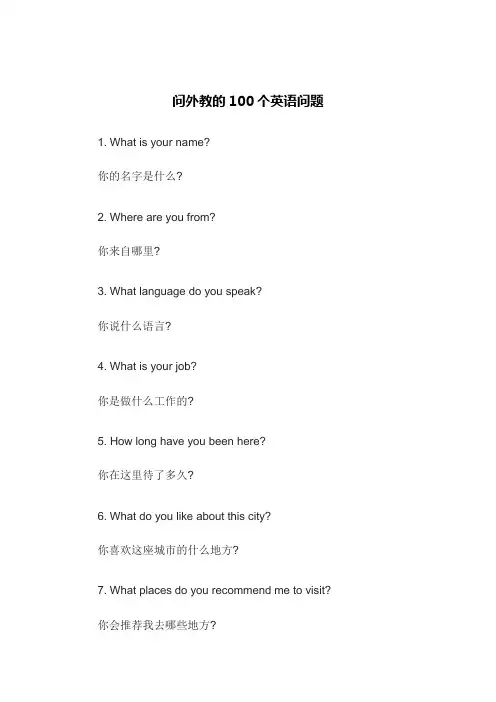
问外教的100个英语问题1. What is your name?你的名字是什么?2. Where are you from?你来自哪里?3. What language do you speak?你说什么语言?4. What is your job?你是做什么工作的?5. How long have you been here?你在这里待了多久?6. What do you like about this city?你喜欢这座城市的什么地方?7. What places do you recommend me to visit?你会推荐我去哪些地方?8. What is your favorite food?你最喜欢吃什么食物?9. Do you have any pets?你有宠物吗?10. What is your favorite hobby?你最喜欢的爱好是什么?11. What is your favorite music?你最喜欢的音乐是什么?12. What is your favorite movie?你最喜欢的电影是什么?13. What is your favorite TV show?你最喜欢的电视节目是什么?14. What is your favorite book?你最喜欢的书籍是什么?15. How do you spend your free time?你平时有什么爱好?16. What do you think of Chinese culture?你觉得中国文化怎么样?17. What do you think of Chinese food?你觉得中国食物怎么样?18. What do you think of Chinese people?你觉得中国人怎么样?19. Have you learned any Chinese?你会说一些中文吗?20. What is your favorite Chinese word?你最喜欢的中文词语是什么?21. What is your impression of China?你对中国有什么印象?22. What is your favorite Chinese holiday?你最喜欢的中国节日是什么?23. What is your favorite Chinese dish?你最喜欢的中国菜是什么?24. What is your favorite Chinese movie?你最喜欢的中国电影是什么?25. What is your favorite Chinese TV show?你最喜欢的中国电视节目是什么?26. What cultural differences have you noticed between your country and China?你觉得你的国家和中国有哪些文化差异?27. What do you think of Chinese education?你觉得中国的教育怎么样?28. What is something unique about your country?你的国家有什么独特的东西?29. What do you miss about your country?你想念你国家的什么?30. What is the most difficult thing about learning English?学习英语最困难的是什么?31. What is the best way to improve your English?提高英语水平的最佳方法是什么?32. What is the difference between American English and British English?美国英语和英国英语有什么区别?33. What are some common English expressions?有哪些常见的英语表达?34. Can you teach me some slang?你可以教我一些俚语吗?35. What is the best way to practice speaking English?练习英语口语最好的方法是什么?36. What is the difference between "affect" and "effect"?"affect"和"effect"有什么区别?37. What is the difference between "there", "their", and "they're"?"there"、"their"和"they're"有什么区别?38. What is the difference between "your" and "you're"?"your"和"you're"有什么区别?39. What does "s/he" mean?"s/he"是什么意思?40. What is the difference between "it's" and "its"?"it's"和"its"有什么区别?41. What are some common English idioms?有哪些常见的英语习语?42. How should I use "shall" in English?如何使用"shall"?43. What is the difference between "may" and "might"? "may"和"might"有什么区别?44. What is the difference between "can" and "could"? "can"和"could"有什么区别?45. What is the difference between "should" and "would"? "should"和"would"有什么区别?46. What is the difference between "will" and "shall"? "will"和"shall"有什么区别?47. What is the difference between "must" and "have to"?"must"和"have to"有什么区别?48. How do I use contractions in English?如何使用缩略词?49. What are some common English abbreviations?有哪些常见的英语缩写?50. What is the difference between "learn" and "teach"?"learn"和"teach"有什么区别?51. How can I improve my writing in English?如何提高英语写作水平?52. What is the difference between "who" and "whom"?"who"和"whom"有什么区别?53. How do I use commas, periods, and other punctuation in English?如何使用英语中的逗号、句号及其他标点符号?54. What is the difference between "few" and "little"?"few"和"little"有什么区别?55. What is the difference between "farther" and "further"? "farther"和"further"有什么区别?56. What is the difference between "good" and "well"? "good"和"well"有什么区别?57. How do I use "the" in English?如何使用"the"?58. What is the difference between "much" and "many"? "much"和"many"有什么区别?59. How do I use "a" and "an" in English?如何使用"a"和"an"?60. What is the difference between "who" and "that"? "who"和"that"有什么区别?61. What is the difference between "like" and "as"? "like"和"as"有什么区别?62. How do I use the verb "to be" in English?如何使用英语中的动词"to be"?63. What is the difference between "in" and "on"? "in"和"on"有什么区别?64. What is the difference between "go" and "come"? "go"和"come"有什么区别?65. What is the difference between "make" and "do"? "make"和"do"有什么区别?66. What is the difference between "take" and "bring"? "take"和"bring"有什么区别?67. What is the difference between "say" and "tell"? "say"和"tell"有什么区别?68. What is the difference between "hear" and "listen"? "hear"和"listen"有什么区别?69. What is the difference between "look" and "see"? "look"和"see"有什么区别?70. What is the difference between "read" and "write"? "read"和"write"有什么区别?71. How do I use prepositions in English?如何使用英语中的介词?72. What is the difference between "since" and "for"? "since"和"for"有什么区别?73. What is the difference between "beside" and "besides"? "beside"和"besides"有什么区别?74. What is the difference between "between" and "among"? "between"和"among"有什么区别?75. What is the difference between "into" and "in to"? "into"和"in to"有什么区别?76. What is the difference between "onto" and "on to"? "onto"和"on to"有什么区别?77. What is the difference between "over" and "above"? "over"和"above"有什么区别?"under"和"below"有什么区别?79. What is the difference between "within" and "inside"? "within"和"inside"有什么区别?80. What is the difference between "toward" and "towards"? "toward"和"towards"有什么区别?81. What is the difference between "via" and "by"? "via"和"by"有什么区别?82. What is the difference between "without" and "outside"? "without"和"outside"有什么区别?83. What is the difference between "about" and "around"? "about"和"around"有什么区别?84. What is the difference between "across" and "over"? "across"和"over"有什么区别?85. What is the difference between "beneath" and "underneath"? "beneath"和"underneath"有什么区别?"by"和"through"有什么区别?87. What is the difference between "next to" and "beside"? "next to"和"beside"有什么区别?88. What is the difference between "in front of" and "before"? "in front of"和"before"有什么区别?89. What is the difference between "behind" and "at the back of"? "behind"和"at the back of"有什么区别?90. What is the difference between "in" and "inside"? "in"和"inside"有什么区别?91. What is the difference between "out" and "outside"? "out"和"outside"有什么区别?92. What is the difference between "over" and "below"? "over"和"below"有什么区别?93. What is the difference between "across" and "around"? "across"和"around"有什么区别?94. What is the difference between "between" and "amongst"?"between"和"amongst"有什么区别?95. What is the difference between "beneath" and "under"?"beneath"和"under"有什么区别?96. What is the difference between "upon" and "on"?"upon"和"on"有什么区别?97. What is the difference between "amid" and "amidst"?"amid"和"amidst"有什么区别?98. What is the difference between "equal to" and "equivalent to"?"equal to"和"equivalent to"有什么区别?99. What is the difference between "where" and "whither"?"where"和"whither"有什么区别?100. What is the difference between "who" and "whom"?"who"和"whom"有什么区别?。
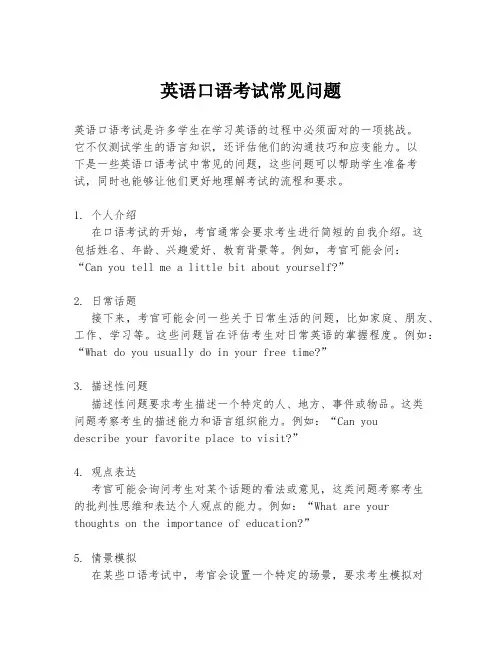
英语口语考试常见问题英语口语考试是许多学生在学习英语的过程中必须面对的一项挑战。
它不仅测试学生的语言知识,还评估他们的沟通技巧和应变能力。
以下是一些英语口语考试中常见的问题,这些问题可以帮助学生准备考试,同时也能够让他们更好地理解考试的流程和要求。
1. 个人介绍在口语考试的开始,考官通常会要求考生进行简短的自我介绍。
这包括姓名、年龄、兴趣爱好、教育背景等。
例如,考官可能会问:“Can you tell me a little bit about yourself?”2. 日常话题接下来,考官可能会问一些关于日常生活的问题,比如家庭、朋友、工作、学习等。
这些问题旨在评估考生对日常英语的掌握程度。
例如:“What do you usually do in your free time?”3. 描述性问题描述性问题要求考生描述一个特定的人、地方、事件或物品。
这类问题考察考生的描述能力和语言组织能力。
例如:“Can youdescribe your favorite place to visit?”4. 观点表达考官可能会询问考生对某个话题的看法或意见,这类问题考察考生的批判性思维和表达个人观点的能力。
例如:“What are your thoughts on the importance of education?”5. 情景模拟在某些口语考试中,考官会设置一个特定的场景,要求考生模拟对话或解决问题。
这类问题考察考生的应变能力和实际应用语言的能力。
例如:“Imagine you are at a restaurant and you have a complaint. How would you express it?”6. 信息提供考官可能会要求考生提供某些信息,如解释一个概念、描述一个过程或提供建议。
这类问题考察考生的信息组织和传递能力。
例如:“Can you explain the process of making a cup of tea?”7. 故事讲述考生可能会被要求讲述一个故事或经历。
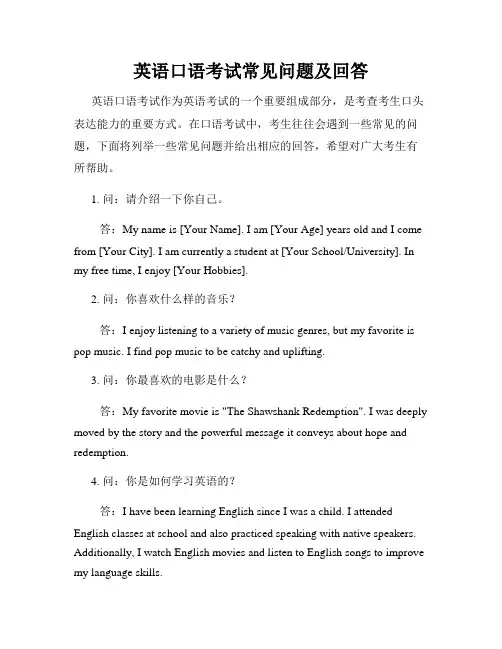
英语口语考试常见问题及回答英语口语考试作为英语考试的一个重要组成部分,是考查考生口头表达能力的重要方式。
在口语考试中,考生往往会遇到一些常见的问题,下面将列举一些常见问题并给出相应的回答,希望对广大考生有所帮助。
1. 问:请介绍一下你自己。
答:My name is [Your Name]. I am [Your Age] years old and I come from [Your City]. I am currently a student at [Your School/University]. In my free time, I enjoy [Your Hobbies].2. 问:你喜欢什么样的音乐?答:I enjoy listening to a variety of music genres, but my favorite is pop music. I find pop music to be catchy and uplifting.3. 问:你最喜欢的电影是什么?答:My favorite movie is "The Shawshank Redemption". I was deeply moved by the story and the powerful message it conveys about hope and redemption.4. 问:你是如何学习英语的?答:I have been learning English since I was a child. I attended English classes at school and also practiced speaking with native speakers. Additionally, I watch English movies and listen to English songs to improve my language skills.5. 问:你觉得学习英语有什么难点?答:I think one of the challenges of learning English is mastering the pronunciation and intonation. It takes practice and patience to improve my spoken English skills.6. 问:你有没有去过国外旅行过?答:Yes, I have traveled to [Name of Country/City]. It was an amazing experience to immerse myself in a different culture and practice speaking English with native speakers.7. 问:你觉得学习英语有什么好处?答:Learning English has many benefits. It opens up opportunities for communication with people from different countries and cultures. It also enhances my career prospects and broadens my horizons.8. 问:你的未来计划是什么?答:In the future, I plan to further improve my English skills and pursue higher education or a career in an English-speaking country. I am excited about the possibilities that fluency in English can bring.以上是一些英语口语考试中可能会遇到的常见问题及相应的回答。
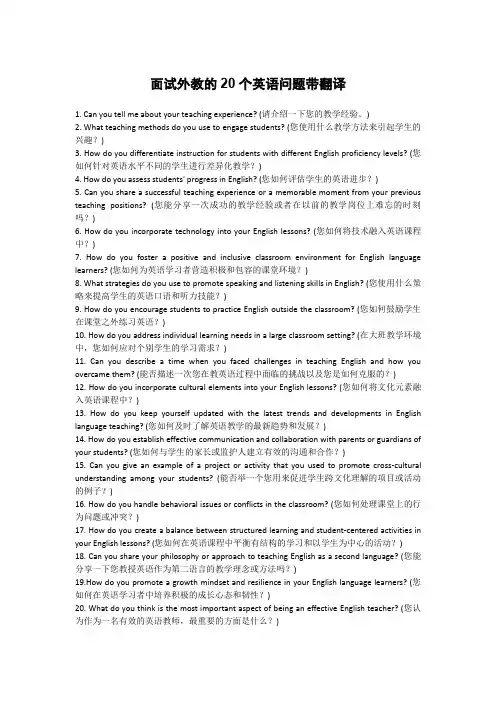
面试外教的20个英语问题带翻译1. Can you tell me about your teaching experience? (请介绍一下您的教学经验。
)2. What teaching methods do you use to engage students? (您使用什么教学方法来引起学生的兴趣?)3. How do you differentiate instruction for students with different English proficiency levels? (您如何针对英语水平不同的学生进行差异化教学?)4. How do you assess students' progress in English? (您如何评估学生的英语进步?)5. Can you share a successful teaching experience or a memorable moment from your previous teaching positions? (您能分享一次成功的教学经验或者在以前的教学岗位上难忘的时刻吗?)6. How do you incorporate technology into your English lessons? (您如何将技术融入英语课程中?)7. How do you foster a positive and inclusive classroom environment for English language learners? (您如何为英语学习者营造积极和包容的课堂环境?)8. What strategies do you use to promote speaking and listening skills in English? (您使用什么策略来提高学生的英语口语和听力技能?)9. How do you encourage students to practice English outside the classroom? (您如何鼓励学生在课堂之外练习英语?)10. How do you address individual learning needs in a large classroom setting? (在大班教学环境中,您如何应对个别学生的学习需求?)11. Can you describe a time when you faced challenges in teaching English and how you overcame them? (能否描述一次您在教英语过程中面临的挑战以及您是如何克服的?)12. How do you incorporate cultural elements into your English lessons? (您如何将文化元素融入英语课程中?)13. How do you keep yourself updated with the latest trends and developments in English language teaching? (您如何及时了解英语教学的最新趋势和发展?)14. How do you establish effective communication and collaboration with parents or guardians of your students? (您如何与学生的家长或监护人建立有效的沟通和合作?)15. Can you give an example of a project or activity that you used to promote cross-cultural understanding among your students? (能否举一个您用来促进学生跨文化理解的项目或活动的例子?)16. How do you handle behavioral issues or conflicts in the classroom? (您如何处理课堂上的行为问题或冲突?)17. How do you create a balance between structured learning and student-centered activities in your English lessons? (您如何在英语课程中平衡有结构的学习和以学生为中心的活动?) 18. Can you share your philosophy or approach to teaching English as a second language? (您能分享一下您教授英语作为第二语言的教学理念或方法吗?)19.How do you promote a growth mindset and resilience in your English language learners? (您如何在英语学习者中培养积极的成长心态和韧性?)20. What do you think is the most important aspect of being an effective English teacher? (您认为作为一名有效的英语教师,最重要的方面是什么?)。
适合与外教交流的100个问题1. Where are you from?2. How long have you been teaching?3. What brought you to teach in this country?4. What do you enjoy most about teaching?5. What do you find most challenging about teaching?6. Have you taught in other countries before?7. What is your favorite subject to teach?8. How do you adapt your teaching style to different cultures?9. How do you handle language barriers in the classroom?10. What is your favorite teaching resource or tool?11. Have you ever experienced culture shock while teaching abroad?12. What are some cultural differences you've noticed in the classroom?13. How do you foster a sense of inclusivity in your classroom?14. What strategies do you use to engage students who may be hesitant to participate?15. How do you handle disciplinary issues in the classroom?16. Have you ever had to deal with a difficult student? How did you handle it?17. What do you find most rewarding about teaching?18. How do you involve parents in their child's education?19. What do you do to stay current with teaching techniques and trends?20. Have you ever had to adapt your teaching to accommodate students with special needs?21. How do you manage time constraints in the classroom?22. Do you have any tips for building strong relationships with students?23. How do you ensure that students with different learning styles are engaged in your lessons?24. What is your approach to motivating students who may be struggling academically?25. How do you incorporate technology in your teaching?26. What are your thoughts on standardized testing?27. Can you share a memorable teaching success story?28. How do you handle burnout or stress as a teacher?29. What do you wish all students understood about the importance of education?30. Have you ever had to deal with a cultural misunderstanding in the classroom? How did you handle it?31. How do you provide feedback to students to help them improve their work?32. What is the most creative lesson plan you've ever implemented?33. How do you encourage critical thinking in your classroom?34. Have you ever had to deal with a difficult parent? How did you handle it?35. How do you promote a positive classroom environment?36. How do you ensure that students feel safe and supported in your classroom?37. What strategies do you use to differentiate instruction for students with different abilities?38. How do you involve students in the assessment process?39. Can you share a favorite teaching resource or lesson idea?40. How do you incorporate student interests and hobbies into your lessons?41. How do you address issues of diversity and inclusion in your classroom?42. What do you do to promote cultural understanding among yourstudents?43. How do you prepare students for future career success?44. Can you share a memorable teaching failure and what you learned from it?45. How do you handle student conflicts or disagreements in the classroom?46. What role do you see technology playing in the future of education?47. How do you foster a love of learning in your students?48. How do you create opportunities for students to voice their opinions and ideas in the classroom?49. Can you share a favorite teaching strategy or technique?50. How do you incorporate real-world examples and applications into your lessons?51. How do you involve students in setting and tracking their own learning goals?52. What is your approach to teaching students who speak English as a second language?53. How do you address the diverse learning needs of your students?54. Can you share a favorite classroom project or activity that you've done with your students?55. How do you promote a growth mindset among your students?56. What is your philosophy of education?57. How do you foster a sense of community within your classroom?58. How do you ensure that all students feel valued and respected in your classroom?59. Can you share a favorite teaching memory from your career?60. How do you incorporate creativity into your lessons?61. How do you promote independent learning and critical thinking skills in your students?62. What role do you see parents playing in their child's education?63. How do you handle different learning paces within the same classroom?64. Can you share a favorite teaching resource or book?65. How do you make learning relevant and meaningful to your students?66. How do you encourage students to take ownership of their learning?67. What role do you see collaboration playing in the classroom?68. How do you use assessment to guide instruction?69. Can you share a favorite teaching strategy or technique for engaging students?70. How do you incorporate cultural diversity into your lessons?71. How do you promote problem-solving skills in your students?72. What strategies do you use to help students overcome learning obstacles or challenges?73. How do you approach teaching students with different levels of prior knowledge?74. Can you share a favorite lesson plan or activity that promotes critical thinking?75. How do you incorporate project-based learning into your curriculum?76. How do you use technology to enhance student learning?77. What is your approach to teaching students who are non-native English speakers?78. How do you encourage students to take risks and learn from their mistakes?79. Can you share a favorite classroom management tip ortechnique?80. How do you promote a sense of ownership and responsibility in your students?81. How do you ensure that students understand the relevance and importance of what they are learning?82. What strategies do you use to engage students in small group discussions or activities?83. How do you incorporate creativity and originality in student work?84. Can you share a favorite teaching resource or website?85. How do you incorporate current events and real-world examples into your lessons?86. How do you address the needs of gifted students in your classroom?87. What is your approach to teaching students with different learning styles?88. How do you foster a sense of curiosity and love for learning in your students?89. Can you share a favorite teaching strategy or technique for promoting independent thinking?90. How do you handle students who are disengaged or unmotivated?91. How do you incorporate social-emotional learning in your lessons?92. How do you assess student learning beyond traditional tests and quizzes?93. What is your approach to teaching students with diverse cultural backgrounds?94. How do you involve students in the decision-making process in your classroom?95. Can you share a favorite hands-on learning activity or experiment?96. How do you create a supportive and inclusive classroom environment for all students?97. How do you encourage students to reflect on their learning and set goals for improvement?98. What strategies do you use to promote collaboration and teamwork among your students?99. How do you incorporate mindfulness and self-care in your teaching practice?100. Can you share a favorite teaching quote or motto that guides your practice?。
面试外教的20个英语问题篇一:When you interview a foreign teacher, there are many things you should consider. Here are 20 questions you can ask to get a better understanding of their teaching style and qualifications:1. What kind of teaching style do you have? Do you use a lot of hands-on activities or just rely on text-based teaching?2. Can you describe a specific example of how you used hands-on activities to help students learn a concept?3. How do you approach problem-solving in your teaching? Do you give students a lot of examples or just require them to solve problems on their own?4. What kind of materials do you use in your teaching? Do you use books, charts, or other tools to help students learn?5. Can you tell me about a time when you had to deal with a difficult student and how you helped them improve?6. How do you ensure that students are understanding the material you are teaching? Do you have regular feedback sessions or just rely on a final exam?7. What are your expectations for students during the class time? Do you have specific goals for each class period or just want to see how the students are doing overall?8. Can you tell me about a time when you had to use extra help to helpa student understand a concept? How did you go about finding the help you needed?9. What kind of support do you have for your students outside of the classroom? Do you have a team of parents or students who help with homework and other tasks?10. How do you plan to maintain your qualifications? Do you have a professional development plan or just rely on taking courses online?11. Can you tell me about a time when you had to do something that was not part of your normal teaching routine to help your students learn? How did you handle the situation?12. How do you stay up-to-date with the latest teaching methods and technologies? Do you take courses or use online resources to stayup-to-date with the latest trends in teaching?13. Can you tell me about a time when you had to make a difficult decision and how you handled it? How did you approach the decision-making process in the classroom?14. How do you maintain a positive attitude in the classroom? Do you have a sense of humor or just be serious all the time?15. Can you tell me about a time when you had to use your personal experiences to help students learn? How did you use your personal experiences to teach your students?16. How do you handle students who are not having a good day or who are making difficult choices? How do you try to help them through the difficult times?17. What do you think is the most important thing for a teacher to remember when teaching students?18. Can you tell me about a time when you had to use your knowledge of the student"s culture to help them learn? How did you use your knowledge of the student"s culture to help them learn?19. How do you ensure that your students are taking advantage of all the resources you provide? Do you have a list of resources or just let students discover them on their own?20. How do you handle any issues that may arise in the classroom? Do you have a plan in place to handle any issues that may occur, or just rely on students to handle things on their own?。
英语口语考试常见问题1. How is life different for the rich as compared with ordinary people?There is always a gap between the rich and the poor. The rich people can enjoy more material comforts as compared with ordinary people. For instance, since they have their own private cars, they don't need to wait for the bus in order to go to school or go to work as ordinary people do. They can enjoy some sports (such as golf) which are more expensive than playing football or basketball. They can also travel around the world without caring too much about how much the trip may cost. However, all the above mentioned comforts don't necessarily equal happiness in our lives. There are still some things more precious than material comforts such as health and love.2. Is money the most important thing in your life? If not, what is?If you are poor, money means a better life. If you have got a liver cancer and need an operation, then money can provide the cure. So money can meet your various material needs and improve your life quality. However, money is not the most important thing in life. Money is not everything. There are still many other things which are more precious, such as family, real friends, happiness, health, true love and so on. I think the most important thing in my life is the happiness and health of my family. It was my parents who comforted me when I was upset and they always encourage me to keep on studying in spite of some set-backs. So they care a lot about me and I care a lot about them too.3. What is your favorite book or movie about war? How hasit affected you and your attitude toward war?I like to read books about wars. My favorite one is The Rape of Nanking written by Iris Chang, in which the author describes the bloody Nanjing Massacre in 1937. The author herself witnessed the massacre and was overwhelmed by the brutality of Japanese army. She suffered mental depression after the war, and committed suicide later on. I was totally shocked by the brutal and inhuman behaviors of Japanese soldiers. Throughout history, we see many wars, which were mostly provoked by disputes about and rivalry for natural resources, such as land, oil, mineral and other resources. History is a mirror for all mankind and we should try our best to solve all kinds of disputes through peaceful means instead of resorting to bloody wars.4.What damage does war do to mankind?The words I would like to use to describe the damage that war brings to human beings are "destruction" and "nightmare". For example, in 2003 the United States, alongside the United Kingdom and smaller contingents from Australia and Poland invaded Iraq in the name of anti-terrorism. From then on, explosions and destruction can be seen everywhere and Iraqis live in a nightmare every day. They live in fear with the sounds of gunfire and bombs every day. A recent survey shows that 7 years after the U.S.-led invasion of Iraq, nearly 9 out of 10 Iraqis say they live in fear that the violence ravaging their country will strike themselves and the people with whom they live.5.What problems may people have as they grow old?Old people are often called senior citizens. As they grow old, two problems may occur to them: sickness in body and weakness in mind. After many years of hard work, most of the old people suffer from various diseases after retirement. But if they keepexercising and stay in high spirits, the disease would seldom break them down. The most serious illness is the weakness in their mind. When they become old, many people think they have lost their dream and value and their existence has no use to their families or society. They sometimes live on their old memories and many of them suffer from mental health problems. So all senior citizens should hold a right attitude towards aging and try to extend their hobbies. By doing so, their physical and mental problems may go away.6.How should we treat old people?Obviously we should treat the elderly with respect. We shouldn't shy away from them because they need our help the most. Though their faces have wrinkles and their bodies become weak, they are people filled with knowledge and wisdom. We shouldn't regard them or their ideas as insignificant or outdated. New studies have shown that the elderly are actually the happiest people — even happier than those intheir 20s, 30s, or 40s. They are more optimistic and, in general, simply happier than the general population. So, when we are around these people in their 80s or 90s, we shouldn't look at them with sympathetic looks. We should be excited to have the chance to talk with them, to listen to them talking about their life experiences and to care about their needs and feelings.7. Why do you think some parents prefer home-schooling for their children?Home-schooling is a legal option in many places for parents to provide their children with a learning environment as an alternative to publicly-provided schools. Parents cite numerous reasons as motivations to home-school, including better academic test results, poor public school environment, improvedcharacter / morality development, and objections to what is taught locally in public school. It may be a factor in the choice of parenting style. It is also an alternative for families living in isolated rural locations or living temporarily abroad. Another reason for home-schooling is that some children just don't like going to schools or have learning difficulties like dyslexia(读写困难). Some children who are physically disabled also chose home-schooling as well.8. How does school education differ from home-schooling?I think the greatest difference is that school education is general education while home-schooling is a kind of individual learning. First, inpublic schools, all kids usually learn the same texts in the same classroom by the same teacher. The learning content may be easy to some students but difficult to others. Students have no choice to choose their own learning content. By contrast, home-schooling provides individual learning contents for children. Second, in most public schools, students are usually taught by a number of teachers while at home children are taught by their parents, that is, one or two teachers. Lastly, in the big classroom, it is almost impossible for teachers to pay equal attention to all the students. But at home, children receive individual attention from parents or teachers. So each method of teaching or learning has its own advantages and disadvantages.9. What is an opinion poll?An opinion poll is a survey of public opinion on a certain subject from a particular sample. It is usually designed to represent the opinions of a population by conducting a series of questionnaires and then calculating the results.The first known example of an opinion poll was a local strawpoll conducted by The Harrisburg Pennsylvanian in 1824, showing Andrew Jackson leading John Quincy Adams by 335 votes to 169 in the contest for the United States Presidency. Such straw votes gradually became more popular. In 1916, the Literary Digest embarked on a national survey and correctly predicted Woodrow Wilson's election as president.Mailing out millions of postcards and simply counting the returns, the Digest correctly called the following four presidential elections.10. How are opinion polls conducted?Opinion polls are maintained through telecommunications or in person-to-person contact for many years. Though they are widely accepted in most areas, various methods and techniques are adopted to efficiently conduct them, like verbal, ballot, and processed types. Opinion polling developed into popular applications through popular thought, although response rates for some surveys declined. Some polling organizations, such as Angus Reid Strategies, YouGov and Zogby use Internet surveys, where a sample is drawn from a large panel of volunteers, and the results are weighed to reflect the demographics of the population of interest. This is in contrast to popular web polls that draw on whoever wishes to participate, rather than a scientific sample of the population, and are therefore not generally considered professional.11. Have you heard of Survivor and Big Brother ? If you have, what do you think of them?Yes, I have heard of the shows Survivor and Big Brother. Survivor is a reality television game show. In the show, contestants are isolated in the wilderness and compete for cash and other prizes. The show uses a system of progressiveelimination, allowing the contestants to vote offother tribe members until only one final contestant remains and wins the title of "Sole Survivor". The format for Survivor was created in 1992 by British television producer Charlie Parsons. The show is credited for making reality television a popular television genre.The reality TV shows derived from participants' desire to get fortune and the audience's interest in spying on others' private life. Although the shows themselves may come and go as popularity wanes, reality TV shows will keep reinventing themselves and remain on the air as long as people are watching it and giving the networks the ratings they desire.12. Why are reality TV shows so popular?First, fame and fortune are very enticing. They can lure everyday people out of their dull lives with offers of money and adoration by television viewers. Reality TV shows have gone from an expose of interpersonal relationships to almost anything imaginable. Other reality TV shows include various themes, such as magic, business, relationships, jobs, skills, fitness, sports, cooking, home repair, car repair, etc.The second reason is that television viewers are simply nosey and prying. People like to know what is going on behind closed doors and if it involves some types of controversy that just makes it all the more intriguing.13. Do you sometimes eat out with friends or relatives? Who pays for the meal?Yes, I often eat out with friends or relatives. Sometimes I pay for the meal and sometimes my friends or relatives foot the bill. Or we just go Dutch. Who pays for the meal depends on situations. If one party is in some financial trouble, the otherparty would probably prefer to pay for the meal. Otherwise, it's better for us to go Dutch, especially when going out with friends.14.Suppose you and your friends are dining at an expensive restaurant. During the meal, one of your friends drops you a hint that you should pay for everything. How would you feel about it?Usually when it is not clear who would pay for the meal or no one proposes to offer us a treat, it is better to go Dutch. If one of my friends drops me a hint that I should pay for everything especially at an expensive restaurant, when I'm not intended to pay, I would probably feel angry about that. Because it makes me think that my friends would like to take advantage of me. Besides, if my friend really wants me to treat him or her, he / she had better make it clear in the first place before we go to dinner.15. Do you like to read crime stories? Why or why not?Yes, I do love reading crime stories, especially the high-tech crime stories, for example, stories about currency counterfeiting, money laundering, intellectual property crime, credit card fraud, computer virus attacks and cyber-terrorism. Crime stories are always glutted withrivalry between overworked cops and foxy criminals. Every aspect of crime writing is explored through clear and informative descriptions offering comprehensive coverage and theoretical sophistication, of which the plot is thrilling and attractive. Crime stories usually have a ground-breaking series, offering scholars, students and discerning readers a comprehensive set of guides to the world of crimes.16. What is considered a crime by law?Crime can be defined in two ways: on the one hand, it can be thought of as acts which break the law; on the other hand, crimes are acts which offend against a set of norms like a moral code.Different human societies may define acts of crime differently. Oxford English dictionary defines crime as an action which constitutes a serious offence against an individual or the state and is punishable by law. Wikipedia believes crime is the breach of rules or laws for which some governing authority (via mechanisms such as legal systems) can ultimately prescribe a conviction.17. Are you interested in the traditions of other peoples in the world? Describe some of them.Personally, I am interested in the wedding tradition in the West. "Something old, something new, something borrowed, something blue" is a popular bridal attire rhyme in the West, which dates back to the Victorian times. Something old refers to wearing something thatrepresents a link with the bride's family and her old life. Usually, the bride wears a piece of family jewelry or maybe her mother's or grandmother's wedding dress. Wearing something new represents good fortune and success in the bride's new life. The bride's wedding dress is usually chosen, if purchased new, but it can be any other new item of the bride's wedding attire. Wearing something borrowed is meant to bring good luck to the marriage, while wearing something blue dates back to biblical times when the color blue was considered to represent purity and fidelity.18. Do you consider your birthday one of the most important days in your life? Why or why not?Many people would argue that one's birthday is one of the most important days in one's life, and I am no exception. First, birthday is an important day for me because in one year there is just one birthday celebration and it provides a lot ofunforgettable memories. Second, my birthday is the anniversary of my birth, and thus it is a specialthanks-giving occasion for me to offer my filial respect to my parents, especially to my mother, without whom I would not have come to this wonderful world filled with endless opportunities and hopes. Third, my birthday witnesses my growth both physically and mentally. In addition, my birthday is considered an important occasion to receive congratulations and sometimes gifts from my close friends. All in all, asone's birthday is one of the most important days in one's life, one should celebrate it in a most meaningful and fruitful way.19.In what places has smoking already been banned? Are you in favor of this policy or not? Why?Smoking has already been banned in most public places, including hospitals, canteens, hotels, transportation vehicles, etc. As far as I am concerned, I am strongly supportive of this policy. The first reason is that the imposition of such a ban on smoking in public places can effectively reduce health risks on the part of both smokers and those around them since smoking is a chief cause for many respiratory diseases. Second, imposing a ban on smoking in public places can serve as an active deterrence to those non-smokers who are itchy to have a try of cigarettes. Anyhow, we need to take preventive measures to guard against those possible smokers-to-be and to let them know that smoking is something they are not supposed to take up.20.What do you suggest we should do to create a smoke-free working environment?In my view, there are a lot of measures we can take to create a smoke-free environment. First, the government should launch ananti-smoking campaign all over the country to help spread the idea that smoking is an "irresponsible" behavior. Second, as we know, giving up smoking is very difficult and once one becomes physically and mentallyaddicted to cigarettes, he will find it hard to quit. Therefore, to those people who are die-hard smokers, more smoking therapy or healing centers should be established to help them abstain from smoking by medical means. Last but not least, we should engage the whole society in helping those addictive smokers to quit smoking; and the society should be tolerant and patient to these smokers so as to help them eradicate their bad habits.21. How good is your memory? Are you good at remembering dates, telephone numbers, people's names, facts for exams, books or jokes you've read and films you've seen?Frankly speaking, my memory is good. I'm very good at remembering people's names and books I've read. When I was only a child, I was often praised by my neighbors for retelling stories from the TV shows, and I was pleased with myself about my good memory, too. When I was at primary school, my eldest sister would often ask me to tell her what I had learnt in class and what kind of people I had met in school. I loved my sister and was willing to share my experience with her. Looking back now, I realize that my story-retelling experiences and the communication with my sister played a significant role in my memory enhancement. Besides, I pay much attention to boosting my memory including reading books which give memory-improvement guidance and doing exercise which will help improve remembrance.22. What methods do you use to remind yourself of pastevents?In order to remind myself of the past event, I usually use three methods: keeping a diary, taking pictures and fixing a red-letter day. Keeping a diary is the most frequently used method. Just like a Chinese proverb that goes "The palest ink is better than the best memory", I often write down past events in my dairy. Taking pictures is another good choice. With the popularity of digital cameras and computers, it becomes convenient for people to take photos and make electronic photo albums which can bring them back to the past in an interesting way. Occasionally, a day is fixed as a red-letter day to remind me what happened in the past. For example, October 23rd is a red-letter day for me because I was born at that time. Anyway, cherishing the past helps us to live a happy life in the future.23. How do people's cultural backgrounds influence their way of thinking? Talking about the influence of cultural backgrounds on people's way of thinking, I come up with a question: why did the spirit of science originate in Greece instead of China? Perhaps referring to different cultural backgrounds can shed some light on this issue. We know that science, which is concerned with understanding nature and its laws, transcends political, social or religious boundaries. Actually, a scientist with scientific spirit is expected to have as little pressure from society and government as possible so that he / she can concentrate on his /her research wholeheartedly. It is believed that in ancient times, Chinese people were basically self-sufficient and self-contented, because they were deeply influenced by their agricultural culture. While in Greece, because of the influence of sailing and the contact with people from different cultures, whatGreek people highly worshiped was freedom which was of crucial importance in doing scientific research. This may explain why the spirit of science originated in Greece rather than in China and may serve as an example to illustrate how people's cultural backgrounds influence their way of thinking.24. How can failure to recognize cultural differences hinder communication? Cultural differences actually reflect people's different attitudes towards life and the world. One who fails to recognize cultural differences is likely to be caught in trouble when he communicates with people from a different culture. For example, a clock in Japan is regarded as a precious gift; while in China it is very rare for one to send a clock as a gift to his / her friend because the Chinese equivalence of "sending a clock" sounds the same as something related to death. Suppose a Chinese receives a clock from a Japanese friend, he / she would naturally feel bad and misunderstand the Japanese, and the Japanese would think that the Chinese could not appreciate his / her kindness. As a result, the misunderstanding inevitably arises and communication is unexpectedly hindered.。
1.What do you think about cosmetic surgery?Nowadays,cosmetic surgery is more and more popular in the world. Perhaps people can be prettier through the cosmetic surgery,while I don’t think we should be beautiful in this way.In my opinion, your face is a gift that your parents gave you when you were born. If you change a part of your face, then you’ll find that it's not reality and you will no longer be yourself. So, I don’t think cosmetic surgery is a good way to make people beautiful.2.Talk about an event that made a strong impression on you.I think the opening ceremony of the Olympic Games in Beijing in 2008 made a strongimpression on me. It happened when I was in junior high school in summer vacation.Because much advance publicity was given to the opening ceremony, we all expected it very much. The opening ceremony showed the history of China. I think ZhangYimou, the director, showed it very well. So, this is the strongest impression on me.3.Talk about a person who made a strong impression on you.I think my dad made a strong impression on me. He is not as serious as most dad of otherchildren, he is an adult like a child. He played with me together, he taught me how to enjoy life. He has a good temper and also won't too strict for me.When I do something wrong, he will smile and tell me how to do it well.I really think that he is a good father.4.Ritual you have here in chinaIn china, there are many rituals on festival day. For example, spring festival is the most important festival in China. On New Year’s Eve, families should get together to have meal. It is big days for families. And after meal there will have leftover on the table, it means that the families will have enough money in a year. And people always stay up all night to welcome the New Year’s Day. Watching the firework is a part of evening activities.5. Ritual in your familyThere is not a fixed ritual in my family. If there is a ritual that I have to say, it maybe the activities on weekend. On weekend, my family will go out together to do something like climbing the mountain, watching the movie, having a big meal or just hanging outside. And I think it's the way to communicate with my families and share the happy time together. This is a ritual of my family.6.Something challenging you have doneI think it is the university entrance exam .In that year, I stayed up late to perpare my eaxm and I had to do lots of exercises to improve my study all day.I had done all what I could do to improve my grades, and my parents always encouraged me.Finally,I got a grade that I expected and I entered this college.7.Something challenging you will have to do in the futureI think the future of the most challenging thing is to grow old.Every girl wants to retain her youth, want to stay in his own the most beautiful that moment.However, we have to grow old with the passage of time.This is a very cruel thing for us, but we have to accept it.Finally, we may die because old, so I think the future of the most challenging thing is to grow old8.Ritual good or bad or bothI think ritual is good. Ritual is a fixed acitivities that people all doing it. As for festival rituals, most of them are honor someone. The rituals will let us remember what the man do. To say the least, most ritual in China no matter the rituals of festival or the family rituals, it always means that families should gather together, it also a chance to communicate with other family members.In this respect, ritual is also good for people.9.Describe someone who has an interesting faceI think my teacher Mr Liu has a interest face.He has a round face, a pair of small eyes, two deep dimples white smile.he has a fat face that I feel no matter he smile or not, the face of him always show a sense of humor.Especially his tell jokes to us with serious face , the face seems more interesting.10.Secret to successI think there are many reasons to be successful. But I think the most important thing is that you should insist what you want to do. We all have dreams, and we all work hard to realize them. But there will always be some problems and setbacks to stop the pace of us.But as the saying goes “where there is will, there is a way”, I think if you insist what you want to do,then you will finally to be successful.11.tell me about sports day.Sport days sometimes referred to as filed days, are events staged by many schools and offices in which people take part in competitive sporting activities. Often with the arm of winning champion or prizes. Sports day are often held at the beginning of autumn. And it’s our students happiness time.12.tell me about the gaokao.Gaokao is amost important thing to us. China’s entrance exam time is June 7th and 8th annually, and this exam could decide that what my further could be.In that year, I stayed up late to prepare Gaokao and I had to do lots of exercises to improve my study all day.I had done all what I could do to improve my grades, and my parents always encouraged me.Gaokao is amost important thing to us.13.tell me about national day.National day is big day when October 1st every year. Which mark the anniversary of the founding of communist china, are traditionally a major holiday on the peking calendar. On the fifth or tenth anniversary of a celebration and a military parade.14.tell me about mid-autumn festival.The mid-autumn festival is a harvest festival celebrated by Chinese. The date is lunar August 15th.Observances have eating mooncakes and performance lion dances.15.tell me about Qingming festival.Qingming festival is a traditionalChinese festival on the first day of the fifth solar term of the traditional Chinese lunisolar calendar.The great significance to Qingming festival to remember past ancestors.The observances have cleaning and sweeping of graves ancestor worship, offering food to deceased, burning joss paper(纸钱) nowadays someone may enjoy greenery of springtime.16.tell me about dragon boat festival.Dragonboat festival is traditional and important festival, the date is the fifth of may according lunar calendar and had a history of more than 2000 years. Dragon boat festival is to commemorate the pariotic poet qu yuan. We will eat zongzi,drink realgar wine and rowing dragon boat. On that day,married daughter will return to the feast.17.tell me what do you know about festival in other countries.I know in western countries have hallowmas,april fool’s day,valentine’s day. And in america haveindependence day as our national day.18.what do you think is the serect of sucessful marriage?I think there have three points of sercet. One is love yourself,marriage maybe can make us receive more love from their partner. But we also need to love ourselves. Second is communication, put the their partner aside can not solve the problem. Both of marriage need to find own problem from the communciation. Third is believe, when you trust your partner, your parnter will trust you.19.what does the word genius mean to you?20.what the greatstivention in human history and why?I think the greastivention in human is papermaking technology,because the invention of paper-making is more convenient than before,And reduce environmental pollution, rise the utilization ratio of materials. Awell known fact is the inventor is cailun in eastern handynasty,it make closer ties to china and the world.21.Electricity is a great invention。
适合与外教交流的100个问题以下是一些适合与外教交流的100个问题:1. What is your name?你叫什么名字?2. Where are you from?你来自哪里?3. Where did you grow up?你在哪里长大的?4. What is your favorite food?你最喜欢的食物是什么?5. Have you traveled to any other countries?你去过其他国家吗?6. Do you have any siblings?你有兄弟姐妹吗?7. What is your favorite hobby?你最喜欢的爱好是什么?8. How long have you been teaching?你已经教了多久了?9. What is the best thing about teaching?教学中最棒的事情是什么?10. What is your teaching philosophy?你的教学理念是什么?11. What is the hardest thing about learning English?学英语最难的事情是什么?12. What advice would you give to someone learning English? 你会给正在学英语的人什么建议?13. What is a typical day like for you?你的典型一天是什么样的?14. What do you enjoy doing in your free time?你在闲暇时间喜欢做什么?15. What is your favorite song?你最喜欢的歌曲是什么?16. What is your favorite TV show?你最喜欢的电视节目是什么?17. Have you ever met any famous people?你曾经见过著名的人吗?18. What is your favorite book?你最喜欢的书是什么?19. What is your favorite movie?你最喜欢的电影是什么?20. What is a place you have always wanted to visit? 你一直想去的一个地方是哪里?21. What is your favorite sport?你最喜欢的运动是什么?22. What is your favorite type of music?你最喜欢的音乐类型是什么?23. What is your favorite thing about your country?你国家最令你喜欢的事情是什么?24. What languages do you speak besides English?除了英语之外,你还会说哪些语言?25. Where did you learn English?你在哪里学习英语的?26. Do you have any pets?你有宠物吗?27. What is your favorite animal?你最喜欢的动物是什么?28. What is your favorite holiday?你最喜欢的假期是什么?29. What is your favorite season?你最喜欢的季节是什么?30. What is something you wish you could do better?你希望自己可以更好的做些什么?31. What is something you are good at?你擅长做些什么?32. What is something you have always wanted to learn? 你一直想学些什么?33. What is your favorite thing to do with friends?你最喜欢和朋友做什么?34. Where is your favorite place to go out to eat?你最喜欢的餐厅在哪里?35. What is your favorite type of cuisine?你最喜欢的菜系是哪种?36. What is something you are afraid of?你害怕的事情是什么?37. What is something you are passionate about?你热爱的事情是什么?38. What is something that makes you happy?是什么让你感到开心?39. What is something that makes you sad?是什么让你感到悲伤?40. What is something that makes you angry?是什么让你感到愤怒?41. What is something that makes you nervous?是什么让你感到紧张?42. What is your favorite childhood memory?你最喜欢的童年回忆是什么?43. What do you think is the most important thing in life?你认为人生最重要的什么?44. Do you have a favorite quote or saying? If so, what is it?你有最喜欢的格言或名言吗?如果有的话,是什么?45. What is the most interesting place you have ever visited?你去过的最有趣的地方是哪里?46. Do you have any favorite traditions in your culture?你文化中有没有一些喜欢的传统?47. How do you celebrate birthdays in your country?你们国家如何庆祝生日?48. Are there any customs or etiquette rules that foreigners should know when visiting your country?在你的国家参观时,有没有一些外国人应该知道的习俗或礼仪规则?49. What is one thing you think people misunderstand about your country?你认为人们对你的国家有哪些误解?50. What is the most challenging part about teaching English as a foreign language?作为外语教师,最具挑战性的是什么?51. How do you approach teaching grammar?你如何教授语法?52. What strategies do you use to help students improve their speaking skills?你使用什么策略来帮助学生提高口语能力?53. How do you keep your students engaged and motivated in the classroom?你如何让学生在课堂上保持积极和动力?54. How do you incorporate cultural aspects into your English lessons?你如何将文化因素融入你的英语教学中?55. What are some common mistakes that English learners make?英语学习者常犯的一些错误有哪些?56. What are some cultural differences that can affect communication between English speakers and non-native speakers?哪些文化差异会影响英语母语者和非母语者之间的交流?57. What are some strategies or tips for improving listening comprehension skills?提高听力理解能力的一些建议或技巧是什么?58. How do you approach teaching vocabulary?你如何教授词汇?59. What are some effective ways for practicing English outside of the classroom?在课堂外练习英语的一些有效方式是什么?60. How do you assess students' progress and understanding in your English classes?你如何评估学生在英语课程中的进展和理解?61. What is your favorite teaching resource or tool to use in the classroom?在课堂上,你最喜欢使用的教学资源或工具是什么?62. How do you handle students with different learning styles or abilities?你如何处理具有不同学习风格或能力的学生?63. How do you create a positive and inclusive learning environment for your students?你如何为学生创造一个积极和包容的学习环境?64. What is one piece of advice you would give to someone considering teaching English as a foreign language?你给考虑从事外语教学的人的一个建议是什么?65. Are there any cultural taboos that foreigners should be aware of when visiting your country?在你的国家访问时,有没有外国人应该注意的文化禁忌?66. What is your favorite holiday or celebration in your country?你在你的国家最喜欢的假期或庆祝活动是什么?67. Can you tell me about a typical dish or food from your country?你能给我介绍一道典型的来自你国家的菜肴吗?68. What are some popular tourist attractions in your country?你国家有哪些受欢迎的旅游景点?69. How do people greet each other in your culture?人们在你的文化中如何互相问候?70. Can you teach me a phrase or saying in your language?你能教我一句你的语言的短语或格言吗?71.How long have you been teaching English?(你教英语有多长时间了?)72. What made you want to become an English teacher?(是什么促使你想成为一名英语教师?)73. How do you typically structure your English lessons?(你通常如何安排你的英语课程?)74. What are some common mistakes that English learners make?(英语学习者常犯的一些常见错误有哪些?)75. Can you recommend any good resources for improving English pronunciation?(你可以推荐一些有助于提高英语发音的好资源吗?)76. What strategies do you find most effective for teaching grammar?(你认为教授语法最有效的策略是什么?)77. How do you encourage your students to speak English more confidently?(你如何鼓励学生更自信地说英语?)78. Have you ever taught English in any other countries?(你在其他国家教过英语吗?)79. What cultural differences have you noticed between teaching English here and in your home country?(你注意到在这里教英语和在你的国家有哪些文化差异?)80. What do you enjoy most about teaching English?(你最喜欢教授英语的哪个方面?)81. Are there any aspects of English language or grammar that you find particularly challenging to teach?(在教授英语或语法方面,你觉得有哪些特别具有挑战性的方面?)82. How do you approach teaching English to different levels of proficiency?(你如何教授不同程度的英语水平?)83. Are there any specific teaching methods or techniques that you find particularly effective?(你认为哪些具体的教学方法或技巧特别有效?)84. Have you noticed any common difficulties or challenges that Chinese students face when learning English?(你注意到中国学生在学习英语时面临哪些常见困难或挑战?)85. Can you recommend any English language immersion programs or activities for further practice?(你可以推荐一些英语沉浸式学习计划或活动以进行进一步的练习吗?)86. How do you adapt your lessons to meet the individual needs of your students?(你如何适应学生的个别需求来调整你的课程?)87. What role do you think technology plays in English language education?(你认为科技在英语教育中扮演着什么样的角色?)88. Are there any particular differences between American English and British English that you emphasize in your teaching?(在你的教学中,有关于美式英语和英式英语的特定区别吗?)89. How do you incorporate culture and real-world contexts into your English lessons?(你如何将文化和现实背景融入你的英语课程?)90. Have you ever had any funny or memorable experiences while teaching English?(你在教英语过程中有过什么有趣或难忘的经历吗?)91.What is one misconception or stereotype about your country that you would like to break?你想要打破的有关你国家的一个误解或刻板印象是什么?非常抱歉,我只能提供文本回答的服务,无法为您提供翻译。
1. 自我介绍时,不得出现中文姓名及学校班级,且要简捷。
上台后第一句话怎么说:Hello,(I’m …) I’m very glad to stand here tell you a story.The title is …2.(无真实姓名,学校班级及所属地区)3.时间不能超过1分钟(自我介绍在1分钟之内)•1.讲故事而不是背故事(讲范文开头对比演示一遍One day,a little monkey is playing by the well。
He looks in the well and shouts)• 2. 语速不要过快:保证在一分钟之内说完,是指小故事的长短而不是语速的快慢。
保证小故事有足够的时间,充分发挥。
• 3.不要浪费时间:开头不要说太多,简单问候即可,否则会破坏演讲气氛。
• 4.不要试图讨好评委这样会是取得事得其反的效果。
(注意事项的开头)• 5.发言前先沉默片刻,转动头部,环视所有观众,让大家知道你的演讲内容很重要,上台后会紧张,这样可缓解紧张情绪,让大家把注意力都集中在你这里来。
• 6.强调开头的几句话很重要,不是声音大,而是通过你的语音语调,抑扬顿挫吸引你的演讲,将大家带入到你的故事当中,(long long ago,there’s a pretty girl,her name is snow white或One day,a little monkey is playing by the well。
He looks in the well and shouts)•7.动作及面部表情,眼神交流:动作不要太多,肢体幅度不要太大,能够表达出故事的内容即可,不要在舞台上乱跑乱跳(因为话筒是在中间的)。
•8.表情要丰富,要与你的故事相结合。
•9.眼睛不要老盯着一个地方看,要与你的观众有眼神的碰撞。
•10.声音语调的变化:音量变化,富于升降变化;速度变化;韵律节奏变化;语气变化;以迟钝的大众为听众,以打动困倦的心为诉求“(Oh!My god!The moon has fallen into the well!”•“噢!我的天!月亮掉到井里头啦!”•11.尽可能把英语说到最好:不要有地方口音,如若实在改不了,就把每个单词的发音读准确,口齿要清晰(How many dogs? How many cats? I can count three dogs, two cats.)•12.具有幽默感和创新能力:尽量不要用大家重复使用太多次数的小故事。
其实,外教老师们都是很好,很和善的,虽然是考试,但是大家也不要紧张,自然发挥就好了。
近年来,流行一种口语考试是通过模拟一个面试进行的,大家可以提前准备一下,就当成一个外企面试好了,也是一次锻炼机会么!
1. Why do you want to be an electrical engineer?
2. What experience do you have with this job?
3. What problem have you faced and how did you solve it?
4. What have you learned from the experience?
5. What mistakes have you made and how did you correct it?
6. Could you tell me your plan in our company if we want you?
7. How much salary do you want?
8. What is your character?
9. What are you interested in?
10. What other skills (not related to jobs) do you have?
11. Professional knowledge:Explain what is series communication?
12. Do you have some questions ?
13 .Ok,You are admitted.。